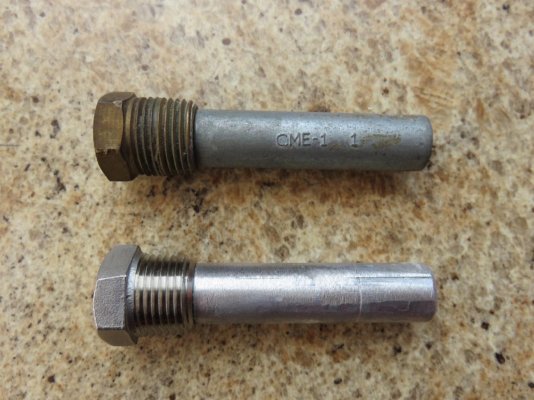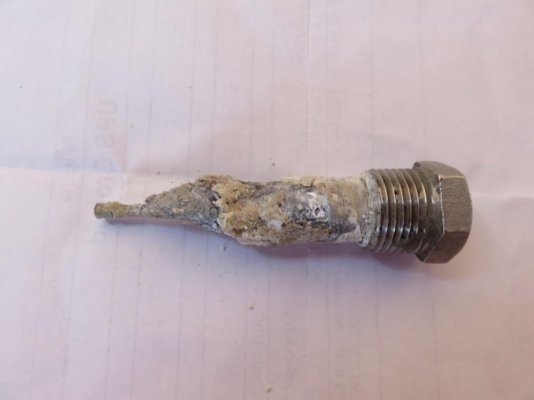You are using an out of date browser. It may not display this or other websites correctly.
You should upgrade or use an alternative browser.
You should upgrade or use an alternative browser.
zinc problem
- Thread starter jann
- Start date
The friendliest place on the web for anyone who enjoys boating.
If you have answers, please help by responding to the unanswered posts.
If you have answers, please help by responding to the unanswered posts.
Russell Clifton
Guru
Happens to me all the time and I have been applying a little light weight synthetic grease to the threads. I have had some luck drilling them for an easy out, but it can be difficult getting a hole started in the center. I understand that muriatic acid will dissolve the zinc. What ever is left inside will eventually dissolve and be flushed out but I remove the end cap of the heat exchanger and remove all I can of the old zinc.
Try taking off the end cap of the exchanger to reach in and remove the zinc residue, as well as some prior impeller pieces perhaps. Tighten your new zincs with pliers before installing and change them out before they get too bad.
Some that drop to the bottom of the housing won't bother anything. Yes any strong acid used for removing heat exchanger scale will slowly dissolve them, but you are wasting acid doing it that way.
David
Some that drop to the bottom of the housing won't bother anything. Yes any strong acid used for removing heat exchanger scale will slowly dissolve them, but you are wasting acid doing it that way.
David
Lepke
Guru
- Joined
- Jun 19, 2016
- Messages
- 3,035
- Location
- US
- Vessel Name
- Charlie Harper
- Vessel Make
- Wheeler Shipyard 83'
If you use a anti seizing compound, the zinc comes out of the plug easily and the plug comes out of the engine easily. Anti seizing compounds contain copper or another metal, so the plug/zinc makes good electrical contact.
If you want to reuse the brass head, heat it with a blow torch and the remaining zinc will “sake” out. Be careful though as you can get splattered with the molten zinc.
Comodave
Moderator Emeritus
- Joined
- Jul 2, 2015
- Messages
- 21,312
- Location
- Au Gres, MI
- Vessel Name
- Black Dog
- Vessel Make
- Formula 41PC
No, I don’t think your anodes are poor quality. That is a pretty common problem with lots of different brands. I usually try to tighten them up before installing them. Then you just have to deal with it when you remove them. I used to have to pull the end cap off the heat exchanger to get the old anode out.
When the zinc is mostly, but not completely used up, there is little or no strength left in the threaded part, so it crumbles and breaks easily. A sign that your change interval is perfectly timed. Shorter and you are removing excess capacity, longer and you are too late.
Take a look at Performance Metals anodes.
https://performancemetals.com/
They have a steel rod / core that greatly reduces breakage.
Its best of the anode threads are tight (maybe even thread lock) so they don't stick to the hole and unscrew as you remove the plug... been there done that and it makes removal a PITA
I have ground the threads off an old plug to allow threading onto a stuck anode rod and been able to remove with pliers / vise grips.
https://performancemetals.com/
They have a steel rod / core that greatly reduces breakage.
Its best of the anode threads are tight (maybe even thread lock) so they don't stick to the hole and unscrew as you remove the plug... been there done that and it makes removal a PITA
I have ground the threads off an old plug to allow threading onto a stuck anode rod and been able to remove with pliers / vise grips.
dhays
Guru
- Joined
- May 26, 2015
- Messages
- 9,048
- Location
- United States
- Vessel Name
- Kinship
- Vessel Make
- North Pacific 43
Jann said that the anode broke off, not unscrewed from the plug. Bacchus suggestion of anode with a center rod will help with that, but so will shortening your inspection interval so the anodes aren’t so fragile.
My biggest problem is not being able to get the anode out of the plug after I have removed them. I much prefer to reuse the plug if I can.
I normally tighten the anode in the plug with a pliers, but I think on the plug/anode combinations that I get from the factory, I may actually remove and reinsert the anode from the plug before I install the plug so I can remove it later.
My biggest problem is not being able to get the anode out of the plug after I have removed them. I much prefer to reuse the plug if I can.
I normally tighten the anode in the plug with a pliers, but I think on the plug/anode combinations that I get from the factory, I may actually remove and reinsert the anode from the plug before I install the plug so I can remove it later.
rgano
Guru
- Joined
- Oct 8, 2007
- Messages
- 4,996
- Location
- USA
- Vessel Name
- FROLIC
- Vessel Make
- Mainship 30 Pilot II since 2015. GB-42 1986-2015. Former Unlimited Tonnage Master
I pull all six Al anodes by Performance Metals from my Yanmar every 60-90 days. At the first pull, I pound the anode with a hammer to get rid of the outer flaking parts. At second pull, I usually replace them. This method has worked well to avoid the dreaded "twist-off" due to a swollen anode leaving the body of the old anode inside the cooler. Enough muriatic acid to just cover the brass holder in a small jar will eat out the broken off part, even Al although Zn get eaten a lot faster.
catalinajack
Guru
I use KoprKote for everything, as an anti-seize, coating for battery connections, and, yes, for screw-in anodes. I just changed a pair and they came out easily. KoprKote is actually copper colored. I have never understood using dielectric grease when a conductive coating such as KoprKote provides the same protection for electrical connections.If you use a anti seizing compound, the zinc comes out of the plug easily and the plug comes out of the engine easily. Anti seizing compounds contain copper or another metal, so the plug/zinc makes good electrical contact.


